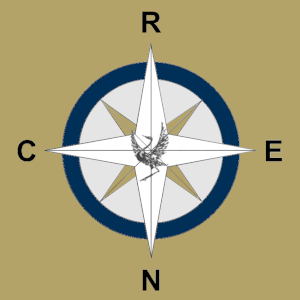Steering committee

Thackery I. Brown
CRaNE director | Associate Professor | Georgia Institute of Technology
Keywords: aging, neuroimaging, human, computation, virtual reality, memory, decision-making
Thematic research area(s): Human Spatial Cognition; Artificial Agents and Robotics; Architecture and Applied Spatial Cognition
Dr. Brown studies the neural and cognitive bases of spatial memory, navigation and decision-making. He is particularly interested in representation and computation – how one brain area processes navigation-relevant information, and how this information is translated into computations in other areas. Two major foci for his current work are aging impacts on navigation systems, and reward and affective influences on spatial behavior.

Scott Moffat
Professor | Georgia Institute of Technology
Keywords: aging, neuroendochrinology, Alzheimer’s, memory, virtual reality
Thematic research area(s): Human Spatial Cognition
Dr. Moffat studies navigational memory and strategy changes with age and age-related disease. His program utilizes VR and imaging tools for behavioral and brain biomarkers of these changes. Dr. Moffat’s lab also examines how endochrinology and nutritional factors influence brain health, spatial cognition, and risk of developing Alzheimer’s.

Bruce Walker
Professor, Georgia Tech School of Psychology and School of Interactive Computing
Keywords: wayfinding; assistive technology; 2D and 3D spatial memory
Thematic research area(s): Human Spatial Cognition; Artificial Agents and Robotics; Architecture and Applied Spatial Cognition
Dr. Walker studies the human-computer interaction (HCI) issues in non-traditional interfaces, ranging from mobile devices, to cockpits and vehicle displays, to multimodal interfaces in education and in complex task environments. Particular research interests include sonification and auditory displays, and wayfinding by persons with disabilities. Professor Walker teaches HCI, Research Methods, Sensation & Perception, Auditory Interfaces, and Assistive Technology.

Aaron Wilber
Associate Professor, Florida State University
Key Words: rodents, virtual mazes, memory, coordinate transformation, Alzheimer’s disease
Thematic research area(s): Animal models of spatial cognition and behavior
Dr. Wilber studies how we orient ourselves in space to navigate our environment and what can go wrong when this system fails. He is currently investigating how our brain coordinates between body-centered and world-centered mapping of our surroundings. His research explores why Alzheimer’s disease leads to difficulty in navigation, what brain changes may underlie the propensity to get lost, the relationship between changes in brain activity patterns during sleep and impaired spatial learning in Alzheimer’s disease, and potential treatments for reversing these impairments.
Members
Sonit Bafna
GT
Morgan Barense
Michael Borich
Emory
Tansu Celikel
GT
Elizabeth Chrastil
UC Irvine
Ben Clark
Associate Professor
UNM
Ana Daugherty
Wayne State
Daniel Dilks
Emory
Arne Ekstrom
U Arizona
Nicholas Giudice
U of Maine
Colin Riess Grove
Emory
Kurt Hunker
ANFA
Cory Inman
U of Utah
Julie Kim
Chair of School of Architecture, GT
GT
Heather Kleider-Offutt
GSU
Lukas Kunz
University of Bonn
Sang Ah Lee
Seoul National University
Mengyao Li
GT
Hsiao-Wen Liao
GT
Stella Lourenco
Emory
Ratan Murty
GT
Nora Newcombe
Temple
Dobromir Rahnev
GT
Tarek Rakha
GT
Shayna Rosenbaum
York U
Francesco Savelli
UT San Antonio
Annabelle Singer
GT / Emory
Matthias Stangl
Jessica Turner
Ohio State
Steven Weisberg
University of Florida
Christopher Wiese
GT
